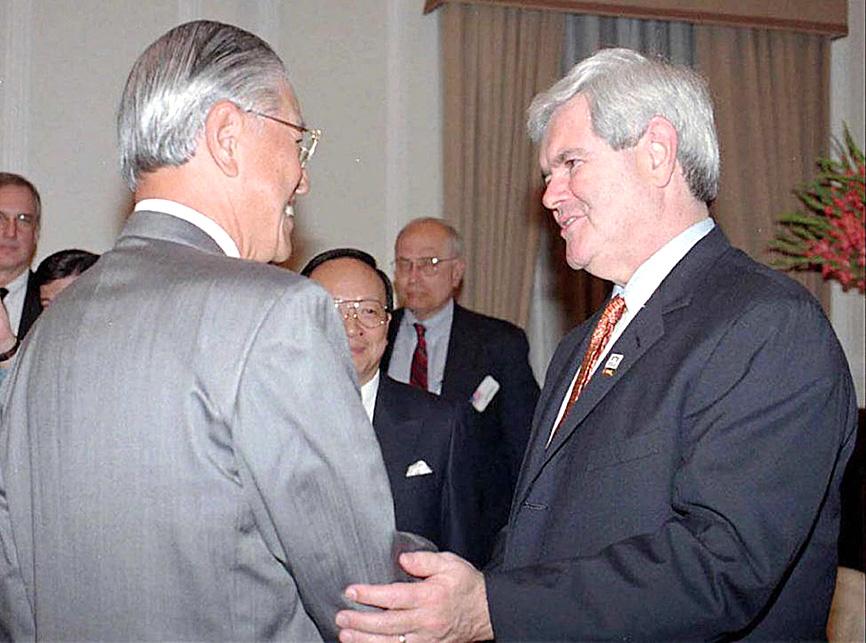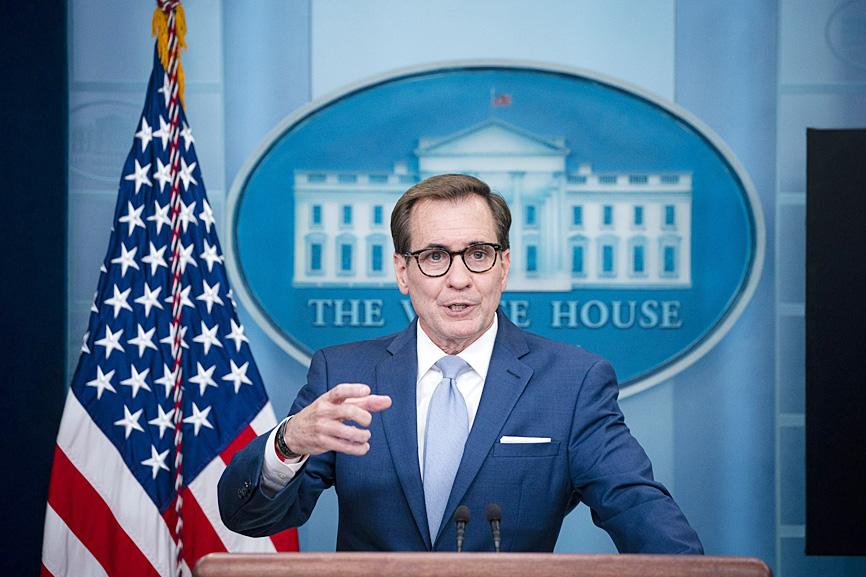More than two dozen Republican US senators on Tuesday voiced their support for US House of Representatives Speaker Nancy Pelosi’s visit to Taiwan, saying that it was consistent with the US’ “one China” policy.
“We support Speaker of the House of Representatives Nancy Pelosi’s trip to Taiwan,” 26 Republican senators said in a joint statement. “For decades, members of the United States Congress, including previous speakers of the House, have traveled to Taiwan.”
Amid strong opposition from China, Pelosi arrived in Taiwan on Tuesday night from Malaysia on the third stop of her tour of Asia, which began on Sunday.

Photo: EDDIE SHIH, AFP
Pelosi is the first sitting US House speaker to visit Taiwan since 1997, when Newt Gingrich traveled to Taipei and met with then-president Lee Teng-hui (李登輝).
“This travel is consistent with the United States’ one China policy to which we are committed,” the senators said. “We are also committed now, more than ever, to all elements of the Taiwan Relations Act.”
The joint statement was issued by US senators Todd Young, Dan Sullivan and 24 others, including US Senate Minority Leader Mitch McConnell, Jim Risch — the ranking member of the Senate Foreign Relations Committee — and Jim Inhofe, the top Republican on the Senate Armed Services Committee.

Photo: Al Drago
However, the Taiwan visit was not unanimously supported in Washington.
US President Joe Biden on July 21 said that “the [US] military thinks it’s not a good idea right now.”
Pelosi defended her visit in a letter to the editor in the Washington Post, saying that the visit showed the US’ commitment to democracy.
“The Taiwan Relations Act set out America’s commitment to a democratic Taiwan, providing the framework for an economic and diplomatic relationship that would quickly flourish into a key partnership,” Pelosi said. “It fostered a deep friendship rooted in shared interests and values: self-determination and self-government, democracy and freedom, human dignity and human rights.”
Pelosi described her visit as that of a US congressional delegation that did not contradict Washington’s “one China” policy.
US National Security Council spokesman John Kirby on Tuesday said that Pelosi has the right to visit Taiwan, adding: “There’s no reason for China to take what is perfectly legitimate and consistent travel by the speaker of the House and turn it into some pretext for amping up the tensions, or creating some sort of crisis or conflict.”
The Chinese response thus far has been “unfortunately right in line with what we had anticipated,” he said, adding that Washington expects China to be preparing to “react over a longer-term horizon.”
“The United States will not seek and does not want a crisis. We are prepared to manage what Beijing chooses to do. At the same time, we will not engage in saber rattling. We will continue to support Taiwan, defend a free and open Indo-Pacific, and seek to maintain communication with Beijing,” he said.
Beyond the military moves, Kirby said China could use "economic coercion" against Taiwan without going into detail.
In other developments, the US Senate Committee on Foreign Relations was today to begin deliberations on a draft Taiwan policy act, which has provisions to give Taipei about US$4.5 billion in security assistance over the next four years.
The bipartisan bill drafted by US senators Robert Menendez and Lindsey Graham additionally stipulates that the US should designate Taiwan as “a major non-NATO ally.”
Further, the bill stipulates that Washington should make preparations for signing a free-trade agreement with Taiwan, among other measures that facilitate “historical, political, economic, cultural and defense ties.”
Additional reporting by Reuters

The US government has signed defense cooperation agreements with Japan and the Philippines to boost the deterrence capabilities of countries in the first island chain, a report by the National Security Bureau (NSB) showed. The main countries on the first island chain include the two nations and Taiwan. The bureau is to present the report at a meeting of the legislature’s Foreign Affairs and National Defense Committee tomorrow. The US military has deployed Typhon missile systems to Japan’s Yamaguchi Prefecture and Zambales province in the Philippines during their joint military exercises. It has also installed NMESIS anti-ship systems in Japan’s Okinawa

TRAGEDY STRIKES TAIPEI: The suspect died after falling off a building after he threw smoke grenades into Taipei Main Station and went on a killing spree in Zhongshan A 27-year-old suspect allegedly threw smoke grenades in Taipei Main Station and then proceeded to Zhongshan MRT Station in a random killing spree that resulted in the death of the suspect and two other civilians, and seven injured, including one in critical condition, as of press time last night. The suspect, identified as a man surnamed Chang Wen (張文), allegedly began the attack at Taipei Main Station, the Taipei Fire Department said, adding that it received a report at 5:24pm that smoke grenades had been thrown in the station. One man in his 50s was rushed to hospital after a cardiac arrest

‘WIN-WIN’: The Philippines, and central and eastern European countries are important potential drone cooperation partners, Minister of Foreign Affairs Lin Chia-lung said Minister of Foreign Affairs Lin Chia-lung (林佳龍) in an interview published yesterday confirmed that there are joint ventures between Taiwan and Poland in the drone industry. Lin made the remark in an exclusive interview with the Chinese-language Liberty Times (the Taipei Times’ sister paper). The government-backed Taiwan Excellence Drone International Business Opportunities Alliance and the Polish Chamber of Unmanned Systems on Wednesday last week signed a memorandum of understanding in Poland to develop a “non-China” supply chain for drones and work together on key technologies. Asked if Taiwan prioritized Poland among central and eastern European countries in drone collaboration, Lin

ON ALERT: Taiwan’s partners would issue warnings if China attempted to use Interpol to target Taiwanese, and the global body has mechanisms to prevent it, an official said China has stationed two to four people specializing in Taiwan affairs at its embassies in several democratic countries to monitor and harass Taiwanese, actions that the host nations would not tolerate, National Security Bureau (NSB) Director-General Tsai Ming-yen (蔡明彥) said yesterday. Tsai made the comments at a meeting of the legislature’s Foreign Affairs and National Defense Committee, which asked him and Minister of National Defense Wellington Koo (顧立雄) to report on potential conflicts in the Taiwan Strait and military preparedness. Democratic Progressive Party (DPP) Legislator Michelle Lin (林楚茵) expressed concern that Beijing has posted personnel from China’s Taiwan Affairs Office to its